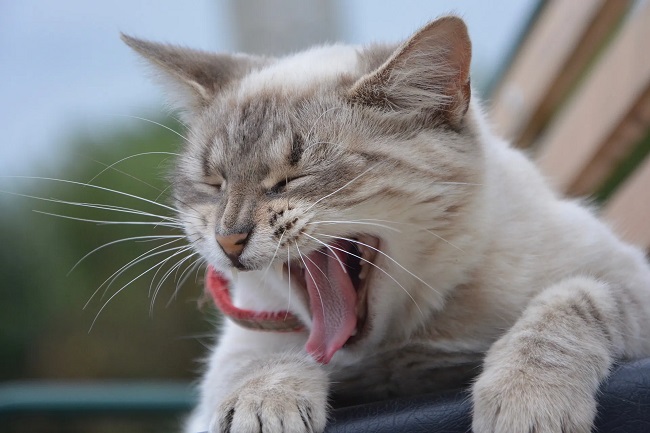Kittens, like any other pets, can sometimes experience health issues. One of the most common yet distressing problems a pet owner can face is when their kitten vomits.
While occasional vomiting may not be a cause for concern, understanding its reasons and knowing when to seek veterinary help is essential for maintaining your kitten’s health.
This article aims to provide comprehensive insights into why your kitten may be vomiting and how to handle it effectively.

Causes of Vomiting in Kittens
Dietary Issues: The most common cause of vomiting in kittens is a sudden change in diet, overeating, or eating too quickly. Kittens have sensitive stomachs and any change in their usual diet can result in upset stomachs.
Hairballs: Kittens are fastidious groomers, and in the process, they often swallow hair. Although their digestive systems are designed to handle this, occasionally, hair can accumulate and form hairballs, causing vomiting.
Ingesting Foreign Objects: Kittens are naturally curious and love to explore their environment, often leading to them eating small objects, plants, or substances that can upset their stomachs and induce vomiting.
Parasites: Gastrointestinal parasites, such as roundworms, are common in kittens and can cause vomiting, among other symptoms. Regular deworming is vital to prevent this.
Illness or Disease: Conditions like gastritis, pancreatitis, and liver disease can also cause vomiting. If your kitten vomits frequently or exhibits other symptoms like lethargy or loss of appetite, it’s crucial to seek veterinary attention promptly.
How to Respond to Kitten Vomiting
Monitor Your Kitten: Keep a close eye on your kitten’s behavior, eating habits, and overall health. Note any changes, including the frequency and appearance of the vomit, and relay this information to your vet.
Hydration is Crucial: Vomiting can lead to dehydration, which can be serious for a kitten. Ensure your kitten has access to clean, fresh water at all times.
Diet Adjustment: Feeding your kitten smaller, more frequent meals can help, particularly if they have a habit of eating too quickly or overeating. If a dietary intolerance is suspected, your vet may suggest a special diet.
Veterinary Attention: If your kitten’s vomiting is frequent, severe, or accompanied by other concerning symptoms, seek veterinary care immediately.
Prevention and Long-Term Care
Maintaining regular vet check-ups is essential for early detection and prevention of many causes of vomiting in kittens.
Regular vaccinations, deworming, and a balanced diet can keep many health issues at bay. Always supervise your kitten to prevent them from ingesting foreign objects.
Understanding Vomiting vs. Regurgitation
Many pet owners mistakenly identify regurgitation as vomiting. Although they might seem similar, they are different processes indicating different issues.
Vomiting is an active process – your kitten will appear uneasy and may produce a hacking noise before expelling food from its stomach.
Regurgitation, on the other hand, is passive. It happens suddenly, without warning, and the expelled food, usually undigested, is often tube-shaped, a shape of the esophagus.
Symptoms Accompanying Kitten Vomiting
Recognizing symptoms that accompany vomiting can help identify the root cause and determine whether you need immediate veterinary assistance. Here are some signs to look out for:
Blood in Vomit: This can indicate serious conditions like ulcers, trauma, or cancer. The presence of blood in the vomit always warrants immediate veterinary attention.
Diarrhea: If your kitten is both vomiting and has diarrhea, it can quickly lead to severe dehydration, especially dangerous for young kittens.
Loss of Appetite: If your kitten is vomiting and refusing to eat, this combination can be a sign of several severe illnesses.
Conclusion
While occasional vomiting may be a part of your kitten’s life, understanding the potential causes and knowing how to respond is crucial for their health and well-being.
Always consult with a vet for persistent or severe vomiting, or if you’re concerned about your kitten’s health. Your furry friend’s well-being depends on your proactive care and attention.
























